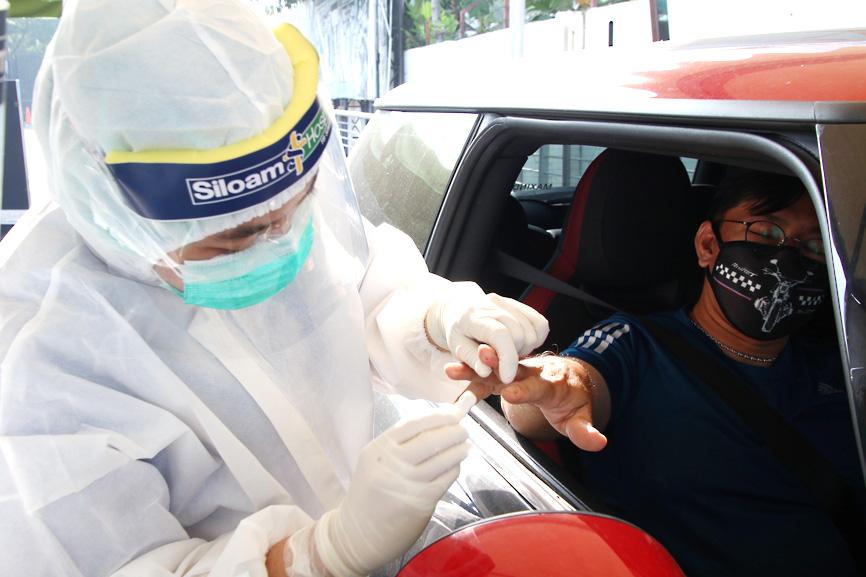The Indonesian government has removed import duties on 73 types of medical and disease prevention products in response to the COVID-19 pandemic, which should make it easier for Taiwanese living there to receive such items, the Taipei Economic and Trade Office in Jakarta said on Sunday.
In a press release earlier in the day, the Indonesian Directorate General of Customs and Excise said that tariffs were being suspended with immediate effect on masks, sanitizers, disinfection products, rapid COVID-19 test kits, polymerase chain reaction test kits, medicines, vitamins, respirators and other medical devices.
The new regulations, which were approved by the government on Friday, extend to governments, individuals and corporations on imports of 73 types of products that have been exempted from import duty, excise tax, value added tax and sales tax on luxury goods.

Photo: CNA
It was the third round of customs revisions to facilitate the import of products needed in the nation’s battle against the COVID-19 pandemic, Indonesian authorities said.
The trade office said the new regulations would make it easier for Taiwanese in Indonesia to receive personal protective equipment (PPE), such as masks, from Taiwan.
Applications for the tax waivers must be submitted electronically on the Indonesia National Single Window portal or in writing to the head of the customs office where the goods are to arrive, authorities said.
For items being brought into the country by arriving passengers, they do not have to submit an application if the product value does not exceed US$500, the authorities said.
Prior to the new regulations, tax waivers on such items was limited to US$3 per passenger.

Vincent Wei led fellow Singaporean farmers around an empty Malaysian plot, laying out plans for a greenhouse and rows of leafy vegetables. What he pitched was not just space for crops, but a lifeline for growers struggling to make ends meet in a city-state with high prices and little vacant land. The future agriculture hub is part of a joint special economic zone launched last year by the two neighbors, expected to cost US$123 million and produce 10,000 tonnes of fresh produce annually. It is attracting Singaporean farmers with promises of cheaper land, labor and energy just over the border.

US actor Matthew McConaughey has filed recordings of his image and voice with US patent authorities to protect them from unauthorized usage by artificial intelligence (AI) platforms, a representative said earlier this week. Several video clips and audio recordings were registered by the commercial arm of the Just Keep Livin’ Foundation, a non-profit created by the Oscar-winning actor and his wife, Camila, according to the US Patent and Trademark Office database. Many artists are increasingly concerned about the uncontrolled use of their image via generative AI since the rollout of ChatGPT and other AI-powered tools. Several US states have adopted

A proposed billionaires’ tax in California has ignited a political uproar in Silicon Valley, with tech titans threatening to leave the state while California Governor Gavin Newsom of the Democratic Party maneuvers to defeat a levy that he fears would lead to an exodus of wealth. A technology mecca, California has more billionaires than any other US state — a few hundred, by some estimates. About half its personal income tax revenue, a financial backbone in the nearly US$350 billion budget, comes from the top 1 percent of earners. A large healthcare union is attempting to place a proposal before

KEEPING UP: The acquisition of a cleanroom in Taiwan would enable Micron to increase production in a market where demand continues to outpace supply, a Micron official said Micron Technology Inc has signed a letter of intent to buy a fabrication site in Taiwan from Powerchip Semiconductor Manufacturing Corp (力積電) for US$1.8 billion to expand its production of memory chips. Micron would take control of the P5 site in Miaoli County’s Tongluo Township (銅鑼) and plans to ramp up DRAM production in phases after the transaction closes in the second quarter, the company said in a statement on Saturday. The acquisition includes an existing 12 inch fab cleanroom of 27,871m2 and would further position Micron to address growing global demand for memory solutions, the company said. Micron expects the transaction to